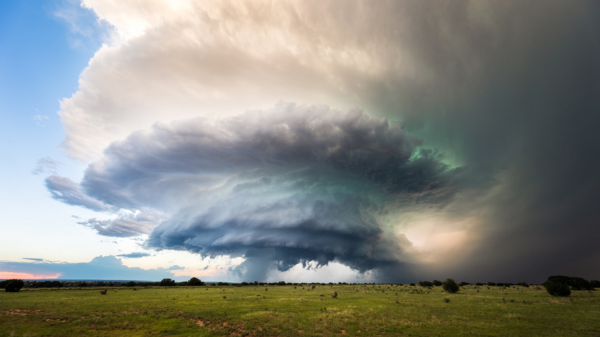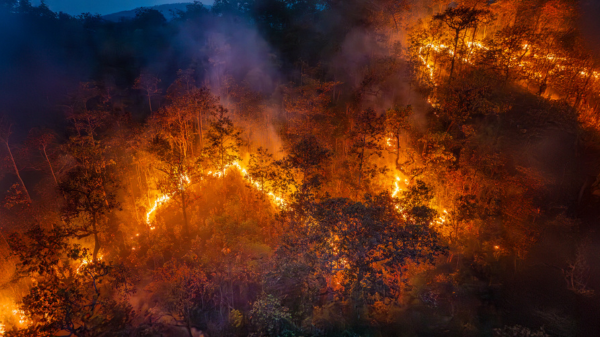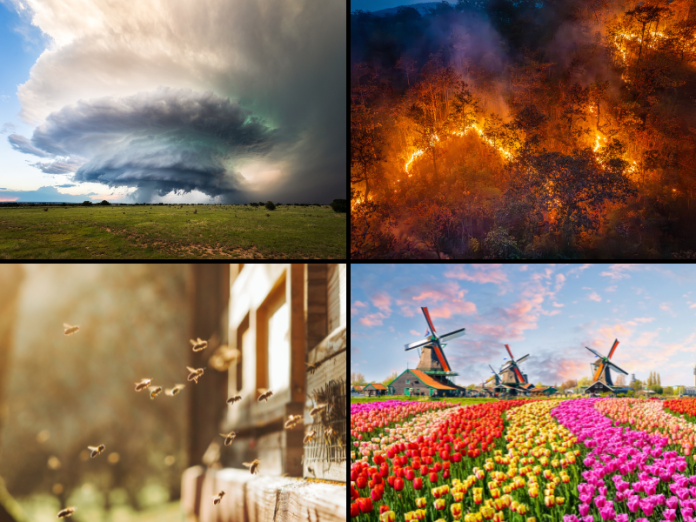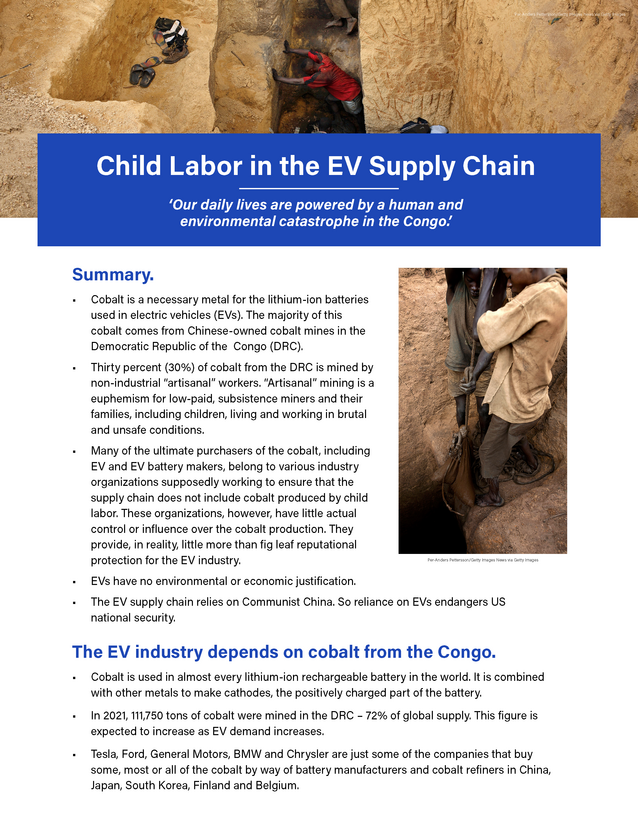YOU SHOULD SUBSCRIBE TO CLIMATE CHANGE WEEKLY.
IN THIS ISSUE:
- On Extreme Weather, the More We Learn, the More We Know How Little We Knew Before (and Still Don’t Know)
- Video of the Week: Climate Change Is Not Making Hurricanes Worse
- Carbon Dioxide-Induced Greening Blamed for Wildfires
- Beepocalypse Not! Bees Are Doing Well Despite Previous Claims
- The Netherlands Reverses Host of Climate Policies
- Podcast of the Week: Climate at a Glance Videos Hit Social Media Near You: Linnea Lueken
- Climate Comedy
- Recommended Sites
Watch ALL the Presentations by the ALL-STARS of Climate Realism at the Archive of Heartland’s 15 Climate Conferences
On Extreme Weather, the More We Learn, the More We Know How Little We Knew Before (and Still Don’t Know)

In contrast to many climate scientists and writers with the mainstream media covering climate change, who in their hubris claim the science is settled, Albert Einstein expressed modesty with regard to his knowledge, reportedly saying, “The more I learn, the more I realize how much I don’t know.”
Eistein, a genius by any measure, was not the first to express such wisdom. Socrates, nearly 2,400 years ago, reputedly stated, “The only true wisdom is in knowing you know nothing,” and Aristotle expressed a similar sentiment, saying, “The only true wisdom is in knowing you know nothing.” Would that contemporary climate researchers displayed such a cautious, honest assessment of the state of knowledge in their field about the causes and consequences of contemporary climate change—but they rarely do.
Still, research comes out daily suggesting that far more remains unknown about climate change and the extent to which it drives extreme weather than is known by climate scientists and their journalist sycophants, and is assumed, and built into, climate models. Two recent studies provide examples showing this.
One recent study, published in the peer-reviewed journal Geophysical Research Letters, examines the correlations of tropical cyclone (TC) activity in the Atlantic and Pacific hurricane basins to multi-decadal variations in sea-surface temperatures tied to shifts in Atlantic Multidecadal Variability (AMV). In analyzing two sets of climate model simulations, adding and subtracting AMV anomalies, researchers found the Atlantic and Pacific respond differently to warm AMV phases, which produce warmer temperatures:
Relative to cold or negative AMV anomalies, a warm AMV:
produces much more frequent TCs (including those making landfalls) over the North Atlantic. This is because AMV+ offers favorable conditions for TC development, including warmer SSTs, higher relative humidity, increased relative vorticity, and weaker vertical wind shear. By contrast, AMV+ causes less frequent TCs across the western North Pacific and South Pacific due to unfavorable conditions for TC occurrence (stronger vertical wind shear and less moist air). The contrasts in TC environment are due to increased zonal flow between the Atlantic and Pacific basins with AMV+.
What they didn’t find to be a factor in hurricane strength or formation was long-term global climate change. Rather, climate models suggest shifts in the Atlantic Ocean current oscillations are the forcing factor for tropical cyclones, or their absence. This study lends credence to the Intergovernmental Panel on Climate Change’s (IPCC) most recent AR6 physical science report, which confirms that there is no detection or attribution of any trend for either the number or strength of tropical cyclones tied to climate change. The IPCC’s assessment suggested that even under the most extreme emission scenarios, it could find no evidence climate change had or would affect tropical cyclones through 2100. (See chart below.)

Despite the IPCC’s clear statements and the findings in this new research, I’d bet money that this year when tropical storms and hurricanes form, especially when one or the other makes landfall and causes damage, mainstream media outlets will publish stories claiming climate change is to blame, citing “studies” from bogus climate science outfits like World Weather Attribution as evidence supporting their claim.
And, of course, hurricanes are only one type of extreme weather event we are only beginning to understand, and, as a result, show how little we know about their formation and cause. Tornados are another such type of event.
Every year, some scientists and reporters in the mainstream media try to tie climate change to the frequency or strength of tornados. Climate Realism has debunked such claims on dozens of occasions, citing research demonstrating there is no trend in increasing numbers or strength of hurricanes. Now the UPI is reporting the same fact.
One recent article published by UPI noted that no EF5 tornado, “one of the most catastrophic weather events on Earth … [which can] grow to be more than a mile wide and pack winds over 200 mph—stronger than any Category 5 hurricane on record across the Atlantic basin,” has struck the United States in more than 11 years—the longest such EF5 drought since consistent records have been maintained. And this is despite billions of additional tons of carbon dioxide being emitted into the atmosphere over that 13-year period. Commenting on this blessed severe tornado drought, UPI writes:
On May 20, 2013, an extremely powerful tornado destroyed a huge part of Moore, Okla. Eleven years later, it remains the most recent tornado to be rated EF5, the strongest possible rating on the Enhanced Fujita Scale. The 11-year gap is the longest since official U.S. records began in 1950.
Before the Moore tornado, the blockbuster tornado season in 2011 led to the confirmation of five EF5 twisters, including the Joplin, Missouri, EF5 that killed 161 people. A total of 50 tornadoes have been rated F5/EF5 since records began in the United States in 1950.
Meteorologist Bob Henson said in 2023 that the current EF5 “drought” is hard to explain since damage estimates can be subjective. Damage to a “well-constructed building” is the most common factor that helps the National Weather Service (NWS) confirm an EF5, yet many homes in the U.S. do not meet that criteria.
During this busy tornado season, think back to how many stories you’ve already seen that mentioned climate change as a factor—modifying their timing, number, behavior, and power. Then, remember mainstream media column inches and broadcast air-time to the contrary, there is no evidence whatsoever that climate change has, will, or can, even in climate models, impact tornados.
Sources: No Tricks Zone; Geophysical Research Letters; UPI
NEW: Get Climate at a Glance on your mobile device!
Video of the Week
Heartland Institute Research Fellow Linnea Lueken answers the question: “Is climate change making tropical cyclones, meaning hurricanes and tropical storms, worse around the world?” The answer is, “No.”
Read the brutal truth about how battery production for electric vehicles cause immense environmental destruction and human tragedy.
Carbon Dioxide-Induced Greening Blamed for Wildfires

New research published in the journal Nature, Communications & Environment suggests the greening induced by higher carbon dioxide concentrations may contribute to an increase in wildfires.
Fuel is one of the three necessary components of wildfires: fuel, an ignition source, and oxygen. Weather can play a role in their spread or in our ability to contain a wildfire once one has begun, but it is neither a necessary nor a sufficient condition for wildfires to ignite and/or to burn.
What’s interesting about this paper is that its authors basically admit increased carbon dioxide is causing a greening of the Earth, normally considered a good thing, but that greening is simultaneously providing additional (potential) fuel for fires once begun. This is true, but what the data shows is that, at present, despite millions of acres of additional fuel and no shortage of oxygen or ignition sources, wildfires have declined dramatically during the period of recent modest warming, as data from NASA and the European Space Agency, presented in Climate at a Glance: Global Wildfires, confirm.
As dozens of posts at Climate Realism discuss, the main cause of the recent spike in wildfires in some locations, primarily the western United States, is a change in forest management philosophy, to one of “hands off, let nature take its course.” This has resulted in densely packed forest areas with an abundance of dead and dying timber left to rot. In addition, forest roads have been ripped. The former has created tinder box conditions and the latter made it difficult to fight fires when they start, before they’ve grown into major conflagrations. Even then, the recent fires have not been as large as those experienced in the region historically.
Aside from the concern that the global greening caused by CO2 is providing additional fuel for wildfires, the Nature study is interesting because of what its authors conclude is not contributing to wildfires: carbon dioxide-induced warming and drying, about which they state, “carbon dioxide radiative impacts, including warming and drying, yield a negligible response of fire carbon emissions.” In short, when it comes to wildfire, the CO2 fertilization effect dominates any climate impact of drying and warming.
In addition, the authors note that although climate models seem to agree that climate change should be causing, and will cause, an increase in wildfires, this is refuted by observational data in the Global Fire Emissions Database version 4.1 with small fires (GFED4.1s). When compared to the GFED4.1s data, models tend to overestimate wildfires.
Sources: Nature Communications; The New American
Beepocalypse Not! Bees Are Doing Well Despite Previous Claims

The Washington Post (WP) and Reason magazine have recently run articles debunking an oft-used climate crisis talking point: that climate change is causing a steep decline in honey bee populations. To appropriate the quote widely attributed to Mark Twain, this time in relation to bees, “The assertions about bees’ demise have been greatly exaggerated.”
Climate Realism has repeatedly, here and here, for example, responded to claims climate change is causing a beepocalyspse, showing that despite the losses created by colony collapse disorder, bees and honey production both are doing just fine. We recently produced a Climate at a Glance video discussing the topic.
Although colony collapse disorder did destroy thousands of hives, killing millions of bees, this wasn’t due to climate change, and it wasn’t universal.
A recent article in Reason pointed to headlines from NBC News, “Bees are dying at an alarming rate,” and CNN, “Bee Population is Dying [putting] the food we eat … at risk,” and Time magazine, “A World Without Bees,” in an article discussing how the much bemoaned pending extinction of bees was misleading from the start.
“Beekeepers adjusted to colony collapse,” reported John Stossel in Reason. “They divided remaining colonies to make new hives. Bee numbers increased by millions.”
He went on to quote Jon Entine, a science journalist who operates the Genetic Literacy Project, who stated, “We’re not in any way facing an apocalypse.”
“Things have never been better in terms of the numbers of bees,” Entine said.
A recent article in the WP confirms Entine’s statement as fact. Citing data from the National Agricultural Statistics Service Census of Agriculture, the WP writes:
America’s honeybee population has rocketed to an all-time high.
We’ve added almost a million bee colonies in the past five years. We now have 3.8 million, the census shows. Since 2007, the first census after alarming bee die-offs began in 2006, the honeybee has been the fastest-growing livestock segment in the country! And that doesn’t count feral honeybees, which may outnumber their captive cousins several times over.
To sum up, the next time an alarming headline proclaims the end of bees and the danger the loss of these key pollinators pose to agricultural production, check the data, which should make you feel secure that neither bees nor food are going anywhere anytime soon.
Sources: The Washington Post; Reason
Heartland’s Must-read Climate Sites



The Netherlands Reverses Host of Climate Policies

The Netherlands recently elected a new right-of-center government which is downplaying climate alarm and European Union (EU)-driven climate policies that harm the country’s residents and agricultural producers.
“Geert Wilders, a prominent figure in Dutch politics, has led a coalition that marks a decisive shift in the Netherlands’ approach to climate policy. Wilders, often dubbed the “Dutch Trump,” formed a new government that includes the Farmer-Citizen Movement (BBB),” writes Charles Rotter at Watts Up With That. Rotter quotes a report in The Telegraph on the political right’s rise in the Netherlands and what it means for climate policy:
The Netherlands will tear up rules forcing homeowners to buy heat pumps as part of a war on net zero by Geert Wilders and the Dutch farmers’ party. Six months after his shock election victory, Mr. Wilders this week struck an agreement to usher in a Right-wing coalition government of four parties. “We are writing history,” he said as he announced the program for the new government.
Among the EU-endorsed climate policies Wilders’ coalition government is rescinding is the heat pump mandate, which would have forced homeowners to switch to expensive, inefficient hybrid heat pumps from traditional air conditioning and heating systems.
The EU had established a goal of installing a minimum of 10 million new heat pumps by 2027 as part of its 2050 net-zero ambition, a plan the previous Dutch government had endorsed and imposed. As The Telegraph reported, the Dutch government’s heat pump mandate was intended to drive “down Dutch household use of natural gas for heating, which is the largest source of its gas consumption, equivalent to about 30 percent in total.”
Commending the new coalition government’s reversal, Caroline van der Plas, leader of the BBB, cheerfully said, “Thanks to BBB’s efforts, the mandatory heat pump will be abolished.”
Agriculture-focused polices the new government is reversing include the previous government’s forced buyout and retirement of farms to cut fertilizer use and associated nitrogen emissions. In its place, the new government will establish a series of voluntary incentives to reduce emissions and offer interested farmers voluntary buyouts to end production.
Wilders government is also set to end subsidies for electric vehicles by 2025, which, as Rotter notes, is “a departure from the EU’s blanket approach to climate policy. These subsidies have been criticized for benefiting the wealthy who can afford electric vehicles while doing little to address broader environmental issues.”
Source: Watts Up With That
Podcast of the Week
In the new Climate at a Glance video series various climate crisis claims are debunked by Linnea Lueken in an eminently watchable, short, fact filled format. The goal is to reach younger audiences, being mislead on social media about climate change, with quick climate facts. The video’s readily accessible on The Heartland Institute’s YouTube channel address topics ranging from the so called climate change consensus to the fact that increased CO2 is leading to a beneficial global greening.
Subscribe to the Environment & Climate News podcast on Apple Podcasts, iHeart, Spotify or wherever you get your podcasts. And be sure to leave a positive review!






























Socrates, nearly 2,400 years ago: “The only true wisdom is in knowing you know nothing,” and Aristotle expressed a similar sentiment, saying, “The only true wisdom is in knowing you know nothing.” I call that plagiarism! LOL
I remember an old saying: ‘The more you learn, the more you know. The more you know, the more you forget. So why study? The less you learn, the less you know. The less you know, the less you forget. So why study?’ Something like that!